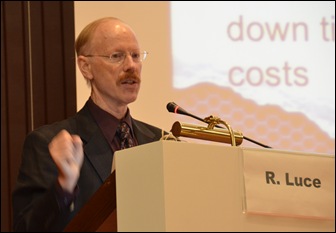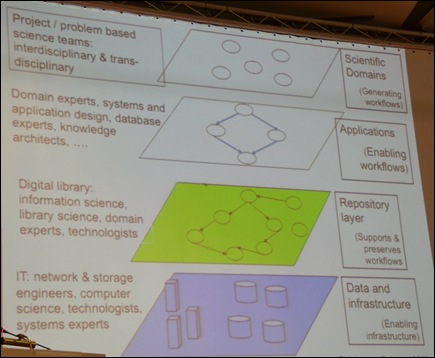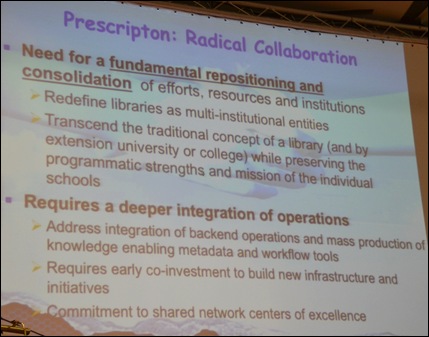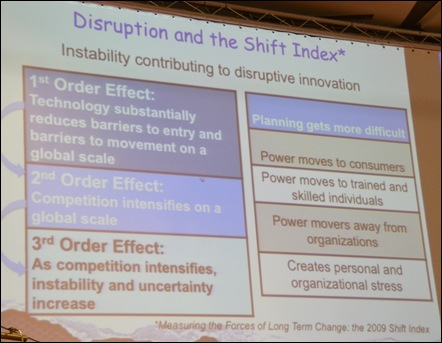 Today it was Rick Luce (Emory University, US) who had the (questionable) honour of issuing a wake-up call to research libraries. This time the topic was not cultural heritage (see yesterday’s post), but the core business of academic libraries: serving researchers and the scientific research process. Check out his slides when they become available on the LIBER website. It is a dazzling summary of all the changes taking place in the sciences: zetabytes of data; dynamic, complex data objects that require management; communities and data flows becoming much more important than static library collections, etc. etc. Luce’s warning: somebody will develop the services the new researcher needs. If the library does not develop those, there is no future for the research library. Luce called for a fundamental transformation process that will affect every aspect of the ‘library’ business.
Today it was Rick Luce (Emory University, US) who had the (questionable) honour of issuing a wake-up call to research libraries. This time the topic was not cultural heritage (see yesterday’s post), but the core business of academic libraries: serving researchers and the scientific research process. Check out his slides when they become available on the LIBER website. It is a dazzling summary of all the changes taking place in the sciences: zetabytes of data; dynamic, complex data objects that require management; communities and data flows becoming much more important than static library collections, etc. etc. Luce’s warning: somebody will develop the services the new researcher needs. If the library does not develop those, there is no future for the research library. Luce called for a fundamental transformation process that will affect every aspect of the ‘library’ business.
In this vision, the role of the ‘library’ is to deliver a layer of middleware between the scientific process and IT infrastructure.
Luce’s advice for libraries on how to bring all this about: ‘Radical Cooperation’:
Such change, of course, does not come easy. Disruption of set patterns makes people nervous – but instability also contributes to disruptive innovation:
Luce warned that ‘Culture will have strategy for breakfast every time.’ It takes years to turn the culture of an organization around.
At the end of this inspiring session, Kurt de Belder of Leiden University asked a crucial question: ‘Are libraries in fact the type of organizations that can make such drastic changes?’ In his response, Luce implied that some will make the change successfully – those who do not will be out of business by 2020. One of those libraries might be that of the librarian who asked how to make researchers deliver the metadata that the library needs during a data workshop this morning. Or was the wake-up call clear enough?
Norbert Lossau of Gottingen asked for advice on how to convince the University Board and staff of all this. Luce’s advice: ‘Look for small victories; do it step by step; work with early adopters within your staff.’
Will research libraries have enough time to get all that done by 2020?
 Neelie Kroes of the European Commission addressing the conference by video. Her agenda: a) open access; b) open data (all public-sector information); c) digital culture (‘By 2025 all European cultural heritage should be digitized and available through Europeana’)
Neelie Kroes of the European Commission addressing the conference by video. Her agenda: a) open access; b) open data (all public-sector information); c) digital culture (‘By 2025 all European cultural heritage should be digitized and available through Europeana’)



Geen opmerkingen:
Een reactie posten